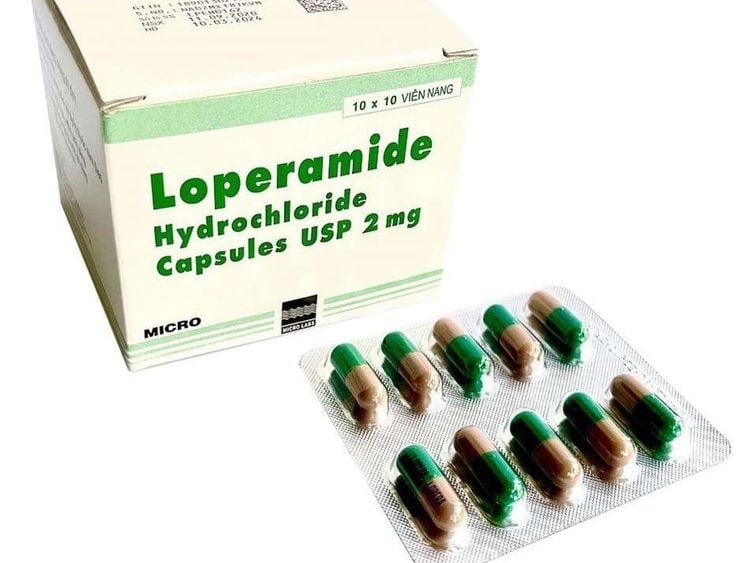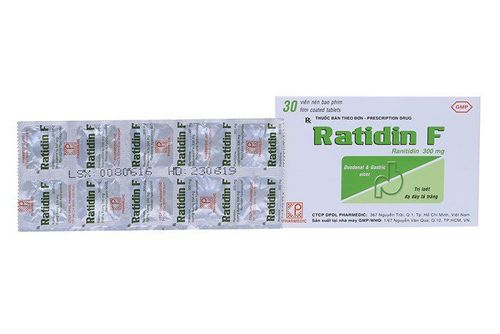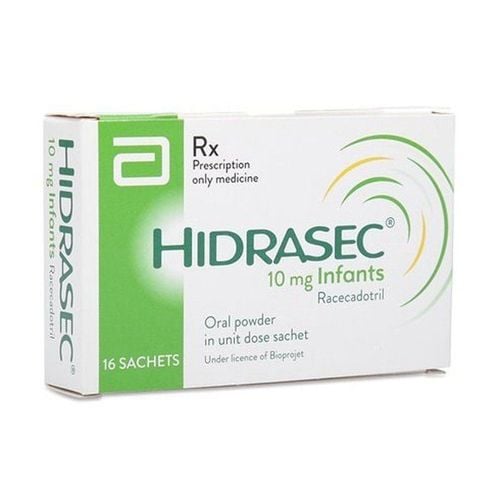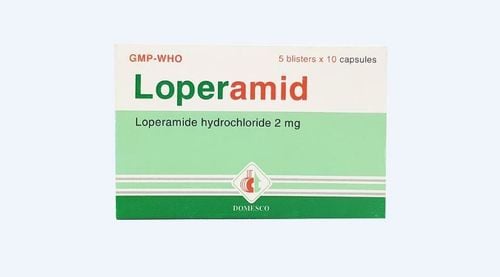This is an automatically translated article.
Loperamide hydrochloride 2mg is a popular gastrointestinal disease medication. The drug is often used to treat sudden diarrhea, loose stools, and effectively control diarrhea.1. What is Loperamide hydrochloride 2mg?
Loperamide hydrochloride has the main ingredient Loperamide. This is a type of pharmaceutical containing active ingredients that bind to opiate receptors in the intestinal mucosa, reducing mucosal irritation and stimulating gastrointestinal contractions. The effect is to reduce intestinal peristalsis, prolong the circulation time in the intestinal lumen. Loperamide also has the effect of increasing the tone of the anal sphincter, thus reducing the urgency in the incontinence reflex.Because Loperamide hydrochloride has a high affinity for the intestinal wall and is metabolized mainly in the first pass through the liver, it is difficult to reach the systemic circulation. Loperamide inhibits intestinal motility due to its direct peripheral effect on the intestinal wall. Studies conducted in animals have shown that effects on the central nervous system appear only when the drug is used at doses exceeding those used in humans. Therefore, the rational use of loperamide has a good effect in the treatment of signs of acute and chronic diarrhea, increasing the circulation and absorption time in people after ileostomy.
However, Loperamide hydrochloride only works to treat the symptoms, not the cause of the diarrhea (such as an infection). The treatment of other signs, symptoms, and causes of diarrhea should be determined by a gastroenterologist.
2. The effect of the drug Loperamide hydrochloride
Loperamide is a medicine for the treatment of acute diarrhea of unknown etiology and certain chronic diarrheal conditions. This drug is also a synthetic opiate that at normal doses has little effect on the central nervous system. Loperamide has the effect of reducing intestinal motility, reducing gastrointestinal secretions, and at the same time, increasing the tone of the anal sphincter. The drug also has the effect of prolonging the transit time through the intestinal mucosa, increasing the ability to transport fluids and electrolytes, and reducing the amount of stool. The effect is related to a decrease in the release of acetylcholine and prostaglandins.
Loperamide hydrochloride is indicated in the treatment of digestive diseases as follows:
Relieves symptoms of acute nonspecific diarrhea, chronic diarrhea caused by intestinal inflammation. Reducing stool volume for those undergoing surgical intervention or ileostomy. Treatment of signs of acute diarrhea in adults and children 12 years of age and older Symptomatic treatment of acute episodes of diarrhea associated with irritable bowel syndrome in adults 18 years of age and older who are preliminary diagnosis by a physician.

Thuốc Loperamide hydrochloride có thành phần chính là Loperamid
3. Undesirable effects of the drug Loperamide hydrochloride
Symptoms such as constipation or distention: bowel obstruction is rare and most often occurs due to non-compliance with the instructions for use. Hypersensitivity Reactions: Generally rare including pruritus, superficial erythema, urticaria extremely rarely, anaphylaxis, toxic epidermal necrolysis, occurring only in subjects with special hypersensitivity to the drug. Other problems such as abdominal pain or discomfort, nausea and vomiting, fatigue, drowsiness or dizziness, dry mouth . However, these symptoms are difficult to distinguish from those associated with the common diarrhea syndrome.
Need side effects The above is not a complete list of all side effects of Loperamide Hydrochloride. In the process of using for the treatment of diseases, you may experience other undesirable effects that have not been shown or have not been studied. If there are any other side effects of Loperamide Hydrochloride that are not specified in the instructions for use, you should consult your doctor.
4. Administration and dosage of Loperamide hydrochloride
Usual Adult Dose for Acute Diarrhea:
For Tablets, Capsules and Liquids:
Initial dose: 4 mg orally after the first loose stool. Maintenance dose: 2 mg orally after each loose stool, not to exceed 16 mg within 24 hours. Clinical signs are usually observed to improve within 48 hours. Chewable tablet form:
Initial dose: use 4mg after the first loose stool; Maintenance dose: 2 mg after each loose stool, but not to exceed 8 mg within 24 hours. Usual Adult Dose for Chronic Diarrhea:
Tablets, Capsules, or Suspension:
Initial dose: 4 mg Loperamide hydrochloride orally once followed by 2 mg after each loose stool. Do not exceed 16 mg within 24 hours. Maintenance dose: an average of 4-8 mg per day. Clinical signs are usually observed to improve within 10 days. If the maximum dose of 16 mg for 10 days does not improve clinically, the symptoms are not guaranteed to be controlled if the drug is taken for additional days.

Loperamide hydrochloride điều trị bệnh tiêu chảy cấp không rõ nguyên nhân và một số tình trạng ỉa chảy mạn tính
5. Loperamide hydrochloride drug interactions
While using Loperamide hydrochloride, you need to inform the treating doctor when you use one of the following drugs:
Antibiotics such as cephalosporin, clindamycin, erythromycin, tetracycline. These antibiotics can cause the adverse effect of diarrhea with prolonged use. At that time, combined with the use of Loperamide can make antibiotic-associated diarrhea worse or last longer. Pain relievers because when Loperamide is used together with these drugs, it increases the risk of causing severe constipation. When using Loperamide hydrochloride with daily foods or alcohol, beer, tobacco... The reason is that in those foods and beverages contain other active ingredients, it can cause effects such as: antagonism or synergy with the drug. Read the instructions for use carefully or consult your doctor or pharmacist about using Loperamide Hydrochloride with food, alcohol and tobacco.
6. Precautions when treating with Loperamide hydrochloride
Before using Loperamide hydrochloride , you should note the following:
Inform your treating doctor and pharmacist if you are allergic to loperamide or other ingredients of the drug; Inform your doctor and pharmacist of any prescription, nonprescription, or herbal medicines you are taking; Notify your treating doctor or pharmacist if you have a fever; Inform your doctor and pharmacist if you are pregnant, plan to become pregnant in the near future or are breast-feeding. If you become pregnant while taking loperamide, call your doctor; The drug may cause fatigue, drowsiness, and dizziness. Do not drive or operate machinery until you know how this medicine affects you; Alcohol can make you even more drowsy caused by loperamide hydrochloride. In individuals with diarrhea, dehydration and electrolyte loss may occur, in which case appropriate electrolyte and rehydration therapy is the most important measure. In patients with acute diarrhea, if the clinical condition does not improve within 48 hours, the drug should not be continued and the cause of the diarrhea should be re-examined. People with liver dysfunction must be closely monitored for signs of CNS toxicity because of phase 1 metabolism. People with AIDS taking this drug to treat diarrhea must stop taking it as soon as signs appear. The earliest signs are abdominal distension. Loperamide hydrochloride 2mg is commonly used to treat sudden diarrhea, loose stools, and effectively control diarrhea. To ensure the effectiveness of use as well as avoid side effects, patients need to take the drug according to a prescription or consult a doctor or pharmacist for advice.
Follow Vinmec International General Hospital website to get more health, nutrition and beauty information to protect the health of yourself and your loved ones in your family.
Please dial HOTLINE for more information or register for an appointment HERE. Download MyVinmec app to make appointments faster and to manage your bookings easily.













